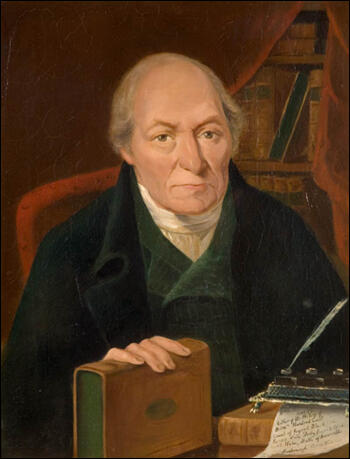William Hutton
William Hutton, the son of a wool-comber, was born in Derby on 30th September, 1723. At the age of five William began going to a school ran by Thomas Meat. After two years education he was sent to work at the local Silk Mill owned by Richard Porter. He later recalled: "My days of play were now drawing to an end. The Silk Mill was proposed. I was accepted. There were three hundred persons employed in the mill, I was the youngest. I had now to rise at five every morning; submit to the cane whenever convenient to the master; be the constant companion of the most rude and vulgar of the human race."
Hutton admitted that in the winter period he struggled to get to work on time: "In the Christmas holidays of 1731 snow was followed by a sharp frost. A thaw came on in the afternoon of the 27th, but in the night the ground was again caught by a frost, which glazed the streets. I did not awake, the next morning, till daylight seemed to appear. I rose in tears, for fear of punishment, and went to my father's bedside, to ask the time. He believed six; I darted out in agonies, and from the bottom of Full Street, to the top of Silk mill Lane, not 200 yards, I fell nine times! Observing no lights in the mill, I knew it was an early hour, and the reflection of the snow had deceived me. Returning, the town clock struck two."
His mother died in childbirth in 1733. William disapproved of his father's drinking and at the age of fifteen he left Derby and found work with his uncle as a stocking-maker in Nottingham. He was a keen reader and in 1746 began collecting books. Three years later he decided to open his own bookshop in Southwell. The shop was successful and by 1751 he moved to a larger shop in the nearby city of Birmingham. Hutton's business continued to expand and by 1763 he was the most the important bookseller in Birmingham.

Hutton was a Quaker and in 1791 he was the victim of the religious riots that took place in the city. Hutton's house was burnt down by a mob who objected to Hutton's religious beliefs. He was later paid £5,390 to compensate him for the damage that had been caused to his property.
William Hutton also published books. This included his own History of Birmingham (1782) and A Narrative of the Riots in Birmingham (1791). After William Hutton's death in 1815 his daughter, Catherine Hutton, published The Life of William Hutton (1816).
Primary Sources
(1) William Hutton, The Life of William Hutton (1816)
My days of play were now drawing to an end. The Silk Mill was proposed. I was accepted. There were three hundred persons employed in the mill, I was the youngest. I had now to rise at five every morning; submit to the cane whenever convenient to the master; be the constant companion of the most rude and vulgar of the human race.
(2) William Hutton, The Life of William Hutton (1816)
In the Christmas holidays of 1731 snow was followed by a sharp frost. A thaw came on in the afternoon of the 27th, but in the night the ground was again caught by a frost, which glazed the streets. I did not awake, the next morning, till daylight seemed to appear. I rose in tears, for fear of punishment, and went to my father's bedside, to ask the time. He believed six; I darted out in agonies, and from the bottom of Full Street, to the top of Silk mill Lane, not 200 yards, I fell nine times! Observing no lights in the mill, I knew it was an early hour, and the reflection of the snow had deceived me. Returning, the town clock struck two.
(3) William Hutton, The Life of William Hutton (1816)
On my tenth birthday my father treated me with a quart of twopenny beer; and observed, that the life of man was divided into seven stages of ten years each, and that I had now completed the first.

